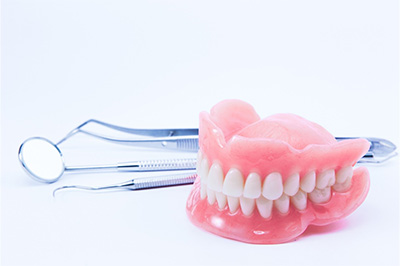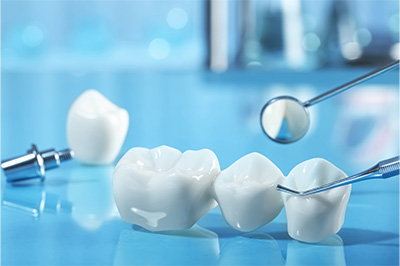Are you ready to have a smile that exudes confidence? Do you want restored functionality in your ability to eat and speak clearly? The team at 333 Dental Care want to help you achieve that by offering dentures in Mangum, OK to restore your smile. Too often, people avoid replacing their missing teeth for fear they’ll be embarrassed by their dentures. With the advancements in dentistry, these restorative methods are far from those used in the 18th and 19th centuries! Now, you can enjoy a functional, beautiful grin without the worry of it feeling uncomfortable or falling out. Call us today to schedule an appointment with Dr. Lively and you’ll feel confident in your smile again in no time!
Dentures – Mangum, OK
Feel Confident in Your Smile Again

Why Choose Us for Dentures?
- Lifelike, Custom Materials Built to Last
- Hometown Dentist with 20+ Years of Experience
- Start-to-Finish Implant Denture Treatment Completed In-House
Who's a Good Candidate for Dentures?

Dentures are an incredibly versatile solution that can rebuild your smile whether you’ve lost some or all your teeth. That means essentially anyone who has suffered from tooth loss can potentially benefit from having them. Before you can be fitted with a restoration, however, you must first have a consultation appointment with Dr. Lively so he can determine whether it’s the best solution for you. Continue reading to learn more about who dentures can help, and feel free to contact us with any additional questions or to schedule an appointment.
Effects of Missing Teeth

Teeth can go missing for several different reasons, including:
- Gum disease. This is the number one leading cause of tooth loss. If harmful bacteria penetrate below your gumline, they can damage the connective tissues holding your pearly whites in place.
- Tooth decay. If your teeth have cavities that go unaddressed, they can penetrate the vulnerable pulp inside which damages the root and nerves and can spread to the jawbone.
- If you participate in contact sports or have physical trauma, you could be knocked with enough force to dislodge a tooth.
Your daily quality of life can suffer when you lose teeth because they play an essential role in your ability to eat and speak. Without them, you may start to feel self-conscious about your lack of ability to complete tasks that once were second nature. You might even become so concerned about how others will perceive you that you avoid smiling or social interactions.
What Qualifies You for Dentures?

You might be a good candidate for dentures if:
- You’ve experienced significant tooth loss.
- Your teeth are overly sensitive to hot and cold temperatures.
- You have developed a large amount of tooth decay.
- You have sufficiently healthy gum tissue and enough jawbone density to support them.
These artificial teeth are versatile and can rebuild your grin whether you’re replacing several or all the ones you were born with. During your consultation, Dr. Lively will make a recommendation based on your dental condition. Full dentures are usually suggested if you’ve lost most or all your teeth, but if only a few have fallen out then you might do better with a partial set.
If you’re worried about your budget, dentures are a great option because they’re typically less costly than other restorative treatments.
Alternative Tooth-Replacement Options

If it’s determined that dentures aren’t ideal for your circumstances, you might do better with other options like dental bridges or implants. A more detailed description of each can be found below:
- Dental bridges. These prosthetic teeth are best for those who are missing one or several pearly whites in a row. They require healthy teeth surrounding the gap to support the dental crowns included on either end of the bridge to anchor it in your mouth.
- Dental implants. These consist of a support rod (usually titanium) that’s surgically inserted into your jawbone and can be used to anchor dentures or can be capped individually with a dental crown. This requires that you have enough jawbone density to support them. If you don’t initially, a bone graft may be able to bulk it up sufficiently.
Types of Dentures

If you think you’re getting wood and bone dentures, you’ll be very happy to know that dental prosthetics have come a long way. Nowadays, we use all-ceramic teeth that attach to an acrylic base that is colored to look like a person’s natural gum tissue. Depending on your individual needs, we may recommend one of the three main types of dentures:
Full Dentures
Full dentures are ideal for patients who are missing all of their original teeth on their top and/or bottom arches. A top denture is designed to cover the entire roof of your mouth while a bottom denture is crafted in the shape of a horseshoe to allow room for your tongue. They are made to sit on top of the gums and offer a personalized, natural appearance. Although your natural suction is what keeps them in place, some patients opt to use an adhesive for extra security.
Partial Dentures
Partial dentures are the go-to option for patients with only a few missing teeth. They work much like a puzzle piece, making it almost impossible for anyone to notice the difference between your real and artificial teeth.
Using the same gum-colored base as a full denture, partials are created with metal clasps or clips that secure to your natural teeth. This is what holds it in place. Partials can be worn on the top or bottom row of teeth.
Implant Dentures
For a more permanent, reliable solution, we can secure a full or partial denture onto an average of four to six dental implants. These titanium posts are surgically placed in the jaw (a procedure that our team can complete in-house), where they merge with the bone and tissue to become as sturdy as the roots of your real teeth. The end result is a prosthetic that doesn’t slip, restores more chewing power, and can last for decades.
How Dentures are Made

Your mouth is one of a kind, which means your dentures will need to be customized in order to ensure that they feel comfortable and look natural. The process of creating your new dentures can take weeks, but all that time will be worth it once you receive the completed prosthesis and are finally able to enjoy a complete smile again. Are you curious to learn more about how your new teeth will be made? Here’s an overview of the basics.
What are Dentures Made Of?

The base of your new denture will normally be made out of acrylic. Other materials can potentially be used, but acrylic is often preferred due to how closely it can match the appearance of your gums. Remember, if you get a partial denture, it may come with metal clips, which are important for making sure that your new teeth stay attached to your mouth.
As for the artificial teeth of the denture, porcelain is often the material of choice. When it has been shaded by an expert, porcelain can blend in with the rest of your smile so well that most people won’t be able to tell the difference between your artificial teeth and your real ones. Rest assured that you won’t be compromising quality for beauty; porcelain is a highly durable material that can be trusted to last for a long time.
The Denture Creation Process

The first steps of the process take place at our office. Using impressions of your gums, our team will create a model of your mouth that can be used to figure out just what size your new denture should be. Once we have a reliable model, we can send it to a dental laboratory.
The experts at the lab will use the model we give them in order to create a wax version of what your final denture will look like. A device called an articulator will be used to insert artificial teeth into their proper spots in the wax base. Before continuing the process, the lab will send us the wax denture so that we can check to make sure it fits properly.
Once the denture is returned to the lab with the confirmation that everything looks right, the next step is to put it in a flask, which will be filled with plaster. After that, the flask will be exposed to hot water to melt the wax; thanks to the plaster, the dentures will keep their shape.
After that, acrylic will be injected into the flask so that it can act as the new base. A liquid separator will be applied to prevent the acrylic from sticking to the plaster. Once the acrylic is in place, the plaster can be carefully removed.
The denture will be trimmed and polished before being sent back to our office for the final time. We’ll let you know that your prosthesis is ready and schedule an appointment so that it can be fitted.
Adjusting to Your New Dentures

Don’t be alarmed if your dentures cause a little bit of discomfort at first. It’s natural for your mouth to need time to get used to the prosthesis. Certain steps, such as only eating soft foods for a while, can help make the adjustment process easier. Eventually, the discomfort should fade on its own.
The Benefits of Dentures

Dentures are a life-changing tooth replacement option for those who have suffered from extensive tooth loss. This prosthetic can restore the appearance and function of the teeth. Read on to learn about some of the numerous benefits that you can experience when you replace your missing teeth with dentures.
Psychological Benefits

If you don’t have any healthy teeth, this can be challenging to accept. Many sufferers of extensive tooth loss encounter negative effects on their self-confidence, leading to a higher risk of sadness and depression. When you restore your smile with dentures, you can feel better about your image, reducing anxieties regarding your appearance, speech articulation, chewing ability, and more!
Clearer Enunciation

With gaps in your smile, it can be difficult to pronounce certain sounds and say different words. To enunciate your words, your lips and tongue need to be positioned properly. When there are gaps in your smile, your tongue isn’t able to sit against the teeth, making some words very difficult to say.
Improves Nutrition

Many nutrient-dense foods are hard in texture. This includes healthy proteins, fruits, and vegetables. If you are unable to chew your food thoroughly thanks to tooth loss, this can negatively affect your eating habits, ultimately resulting in poor dietary choices and indigestion. With dentures, you can chew your food more easily, giving you the freedom to enjoy a more expansive diet.
Preserves Oral Health

If you have remaining natural teeth, dentures can help to keep them healthy. By filling in the empty gaps with a partial denture, you can keep the surrounding teeth from shifting around. Dentures also help to bear some of the weight of regular biting and chewing, limiting the wear and tear of your remaining natural teeth.
Expands Opportunities

When attending interviews, negotiating sales, and attending social events, making an excellent first impression is key. Since your smile is one of the very first things that people notice about you, having teeth that appear to be healthy will do nothing but help. In fact, studies have shown that the probability of being employed is negatively associated with having poor oral health.
Understanding the Cost of Dentures

After learning about dentures, you’re probably more excited than ever to start rebuilding your smile. However, you may be wondering about the cost of dentures in Mangum before you decide to move forward with the process. During your consultation, our team at 333 Dental Care will conduct an oral examination and explain which factors will affect the final price. Following the appointment, you’ll have a better understanding of what you can expect to pay for your treatment.
Factors That Affect the Cost of Dentures

Multiple considerations can influence the price of dentures in Mangum, including:
- Any work needed beforehand like tooth extractions or periodontal therapy
- The number of teeth you’re missing
- The type of acrylic used for the base (part that is dyed to match color of gum tissue)
- The materials your denture will be made of (usually porcelain or acrylic)
Is cost a priority? If so, you may be tempted to opt for cheaper dentures. Even though the upfront cost is certainly lower, they tend to break easily and require replacement much sooner than you’d expect. That’s why quality should always be of utmost importance, regardless of the cost.
Are Implant Dentures More Expensive?

Yes, implant dentures are generally more expensive than traditional ones. However, there’s a good explanation for that. They require oral surgery and the placement of multiple dental implants, making them more reliable for everyday use since they do not shift out of place. Many patients discover this method of tooth replacement is well worth the investment because of several tremendous benefits.
Not only do implants stimulate the jawbone, but they can last decades or even a lifetime with proper care and maintenance with help from your denture dentist in Mangum. That means you won’t have to worry about replacing your dentures nearly as often!
Does Dental Insurance Cover Dentures?

Dentures are considered a major procedure which is why most dental insurance plans will cover approximately 50 percent of their cost. Certainly, every policy is unique, meaning the amount of coverage provided will vary from patient to patient. If you have any questions about your plan, contact your insurance provider or ask our dental team for assistance. We will gladly review the details of your policy and do everything possible to maximize your benefits and reduce out-of-pocket expenses.
Another Option for Making Dentures Affordable

We understand not everyone has dental insurance which is why we offer an additional financing option to make your dental bills much easier to manage. With CareCredit financing, you can split up the total cost of your treatment into smaller, budget-friendly monthly installments. Options even come with little-to-no interest!
Ready to begin down the path to a beautiful, complete smile? Contact us today to schedule a consultation so we can answer any questions you might have.
Denture FAQs

Want to know more about dentures in Mangum? Our talented team has gathered some of the most common questions about this popular restoration and answered them below. Take a look at the information here and then give our office a call to schedule an initial consultation with Dr. Lively!
What Is the Average Age for Dentures?
Although tooth loss is not inevitable, it is a common issue – especially among older patients. According to the National Center of Health Statistics, about 66% of adults between the ages of 40 and 64 are missing at least one tooth, compared to only 33% of adults aged 20-39. So, you are more likely to need partial or full dentures if you are over the age of 40. If you are entering your golden years, you are even more likely to need replacement teeth to eat, speak, and smile. The American Dental Association took a census that found that nearly 57% of people ages 65 to 74 wear some form of denture. However, it’s important to note that while the need for false teeth generally increases as you age, people of all ages can potentially be candidates for dentures.
Can I Sleep with My Dentures?
In general, we recommend that you take out your dentures at night when you go to bed. The only major exception is during the first 24 hours after getting your dentures in Mangum. During that first day and night you should wear your dentures around the clock. After that, however, you should be taking your replacement teeth out every evening. Wearing dentures restricts the circulation in your gums, leading to soft tissue irritation and potentially speeding up ridge resorption. Taking dentures out gives the gums a chance to recover and get the nutrients they need during the night. In addition, removing your dentures at night is also good for your oral health. The dark, moist space underneath dentures is an ideal place for bacteria to thrive. For this reason, sleeping with dentures has been found to be associated with a higher risk of pneumonia. Poor oral hygiene and higher levels of gum and tongue plaque are associated with wearing your dentures for too long.
Can You Kiss with Dentures?
Yes! It is completely possible to kiss while wearing dentures. However, it may take time to get use to how it feels. Since dentures don’t contain any nerves like real teeth do, you must be cautious to avoid kissing anyone too hard or bumping your dentures against your partner’s teeth. Be sure to kiss gently when you’re wearing dentures so that your prosthetic teeth don’t shift out of place.
Will It Hurt to Get Dentures?
You may experience some minor irritation after getting dentures. The amount of time that the discomfort lasts will vary from person to person. You can likely expect your mouth to adjust to the new appliance and irritation to disappear after a few months.
If you need to have teeth extracted before getting dentures, you are likely to experience some discomfort after the oral surgery. You can take prescribed pain medication as directed by a dentist during this period to help. The discomfort should improve 3 to 5 days after the procedure. If the pain persists, call a denture dentist in Mangum as soon as possible. Your dentures might not have been fitted properly, or there might be an underlying oral health issue that needs to be addressed.

